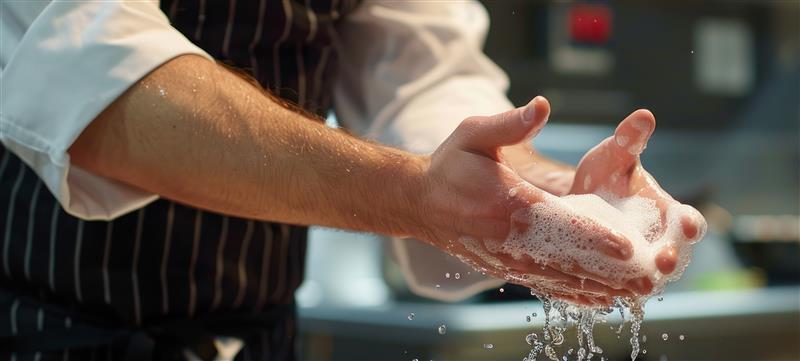The festive season is upon us, meaning that very soon everyone’s attention will turn to that most momentous of occasions — Christmas dinner. For many people, the Xmas roast is the highlight of the holiday season; a time when family and friends get together to celebrate Christmas over a colossal turkey, mound of veg and flaming Christmas pudding.
Until the 25th December comes around, however, the onset of the festive season means that more people than ever will be heading out for dinner to their favourite eateries. During December, restaurants, cafes and bars achieve record footfall — due in part to the number of Christmas parties taking place throughout the month. This can place additional strain on dining staff, meaning that mistakes and errors can creep into usual food safety procedures.
To help chefs both at home and in commercial kitchens cook up a Christmas feast to be proud of, here are our festive food safety tips on avoiding food poisoning this Christmastime.
Tips on Roasting the Perfect Christmas Turkey
For over a century, turkey has been the go-to bird for the Christmas roast, providing enough meat for even the biggest family celebrations. Due to the size of the poultry, however, it can be difficult to cook — particularly for those not accustomed to handling, preparing and ultimately cooking a bird of this size. Here, we provide some essential tips on how to safely prepare and roast a Christmas turkey.
Defrost Thoroughly
If you’ve purchased a frozen turkey, it’s vitally important you defrost the poultry thoroughly before cooking. A medium or large turkey can take up to 48 hours to defrost, so make sure it’s removed from the freezer well in advance.
The best way to defrost a turkey is to place it in a large dish, cover it with a tin foil and place it on a shelf in the fridge or somewhere else cool. Make sure the dish is large enough to collect any liquid that drains from the bird as it defrosts, as this will help to prevent cross-contamination.
Don’t wash the turkey before cooking
Though washing a raw turkey before placing it in the oven may seem logical, doing so is unnecessary and can lead to the spread of germs around the kitchen. Upon coming in contact with water, harmful bacteria can be easily transferred to nearby utensils and surfaces, increasing the likelihood of contamination.
According to the FSA, 80% of people who cook a turkey wash it beforehand, leading to a significant increase in the likelihood of food poisoning. Germs that cause food poisoning can linger for days in the sink, but will be killed once the bird is cooked through.
Make sure the turkey is cooked thoroughly
Due to their size, it can be difficult to ascertain when a turkey is cooked thoroughly or not. Even if the outer skin is golden and well roasted, the meat inside may still be pink and raw, something which will almost certainly cause food poisoning.
Depending on the size of the bird, we’d recommend checking the internal temperature of the turkey after it has been in the oven 3 hours, and every half an hour after that. The easiest way to do this is with an oven-safe thermometer, which should be inserted into the thigh without touching the bone. The poultry is cooked once the thigh meat temperature reaches 180° F (82°C).
If you don’t have a thermometer to hand, cut into the thickest part of the turkey to check if the meat is cooked and check that the cooking juices are running out clear. Be aware, however, that bacteria can survive in temperatures up to 165°F (74°C) — so it’s best to use a thermometer to ensure optimum cooking temperature.
Other Festive Food Safety Tips
Cooking Christmas dinner for a large number of people can be stressful, so to help you serve up a delicious Xmas roast that’s 100% safe to eat, here are some further festive food safety tips.
1. Avoid cross-contamination: Cross-contamination is one of the leading causes of food poisoning, and occurs when germs from raw meat come in contact with vegetables and other foodstuffs. To avoid cross-contamination, use different chopping boards and knives when preparing and handling raw meat, and make sure they are cleaned thoroughly before and after use. It’s also a good idea to store raw meat on a different shelf in the fridge.
2. Prepare other foods safely: Most people understand the importance of food safety when preparing and cooking a Christmas turkey, but other foodstuffs such as vegetables and fruits also carry a food poisoning risk if not prepared properly. Be sure to wash and peel vegetables carefully when prepping a roast, as soil can often contain harmful bacteria.
3. Manage Your Fridge Carefully: How food is stored in the fridge can often make all the difference when it comes to avoiding cross-contamination and food poisoning. Make sure the fridge is set to the right temperature (preferably below 5°C), and that raw meat is kept on a separate shelf from other foods. It’s also worth noting that you should never pack food too tightly in the fridge, as this will prevent cold air from circulating properly.
For more top tips and advice on festive food safety, contact the Shieldyourself team today by visiting our website or calling 020 3797 2612.



